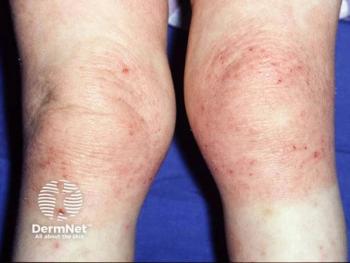
Lebrikizumab Demonstrates Positive Results in Multiple Phase 3 Trials
Eli Lilly announced that lebrikizumab has met all primary and key secondary endpoints at week 16 in their 2 phase 3 trials.
Eli Lilly announced lebrikizumab met all primary endpoints and the secondary endpoints of itch, interference of itch on sleep and quality of life at week 16 in 2 phase 3 trials (ADvocate 1; NCT04146363 and ADvocate 2; NCT04178967).
Lebrikizumab is a novel monoclonal antibody that binds soluble interleukin (IL)-13 with high affinity and bioavailability while blocking the IL-13 signal for the treatment of atopic dermatitis (AD).
"AD is a heterogenous disease with signs and symptoms varying greatly between patients, underscoring the need for additional treatment options with different mechanisms of action," said Jonathan Silverberg, MD, PhD, MPH, associate professor of dermatology at George Washington University School of Medicine and Health Sciences in Washington, DC, and a principal investigator of the ADvocate 2 trial. "Data from the studies showed lebrikizumab's effect on skin clearance and its potential to address a key driver for this disease as well as provide improvements in itch, sleep disturbance and quality of life."
Both trials are ongoing 52-week, randomized, double-blind, placebo-controlled, parallel group, phase 3 studies to investigate lebrikizumab as a monotherapy in patients ages 12 and older (weighing at least 40 kg) with moderate to severe AD.
The primary endpoints of the studies, assessed at week 16, were the number of patients achieving a reduction of at least 2 points from baseline in the Investigator Global Assessment (IGA) score of 0/1 and at least a 75% or greater change in Eczema Area and Severity Index (EASI) from baseline. Lebrikizumab led to an EASI 75 skin clearance score in more than half of the patients with moderate to severe AD in both trials.
The secondary endpoints of early onset in skin clearance and itch relief, improvement in interference of itch on sleep and quality of life, measured by IGA, EASI, the Pruritus Numeric Rating Scale, Sleep-Loss due to Pruritus and the Dermatology Life Quality Index.
The adverse events (AEs) and serious AEs (SAEs) were consistent with a previous phase 2 (NCT03443024) trial. The most common AEs included conjunctivitis, nasopharyngitis, and headache for lebrikizumab-treated patients and discontinuations because AEs were similar in the lebrikizumab arm (1.4%) vs placebo (1.7%).
"We understand the needs of people in the AD community worldwide and are aware that many are still in need of new treatment options despite available medicines," said Lotus Mallbris, MD, PhD, vice president of immunology development at Eli Lilly, Indianapolis, Indiana. "Lebrikizumab is a specific inhibitor of IL-13 that offers robust binding affinity and high bioavailability. Today's results show that the inhibition of IL-13 cytokine plays a main role in AD treatment, as demonstrated by more than half of the patients achieving at least 75% clearance to total clearance on lebrikizumab monotherapy."
The FDA has granted Fast Track Designation to lebrikizumab for moderate to severe AD patients 12 years and older and the full results from the trials will be disclosed in 2022.
More information on the ADhere (NCT04250337), ADJoin (NCT04392154), and ADore (NCT04250350) trials regarding the lebrikizumab phase 3 programs will be available at a later date.
Reference:
1. Lilly’s lebrikizumab significantly improved skin clearance and itch in people with moderate-to-severe atopic dermatitis in two Phase 3 trials | Eli Lilly and Company. Accessed August 17, 2021. https://investor.lilly.com/news-releases/news-release-details/lillys-lebrikizumab-significantly-improved-skin-clearance-and
Newsletter
Like what you’re reading? Subscribe to Dermatology Times for weekly updates on therapies, innovations, and real-world practice tips.











